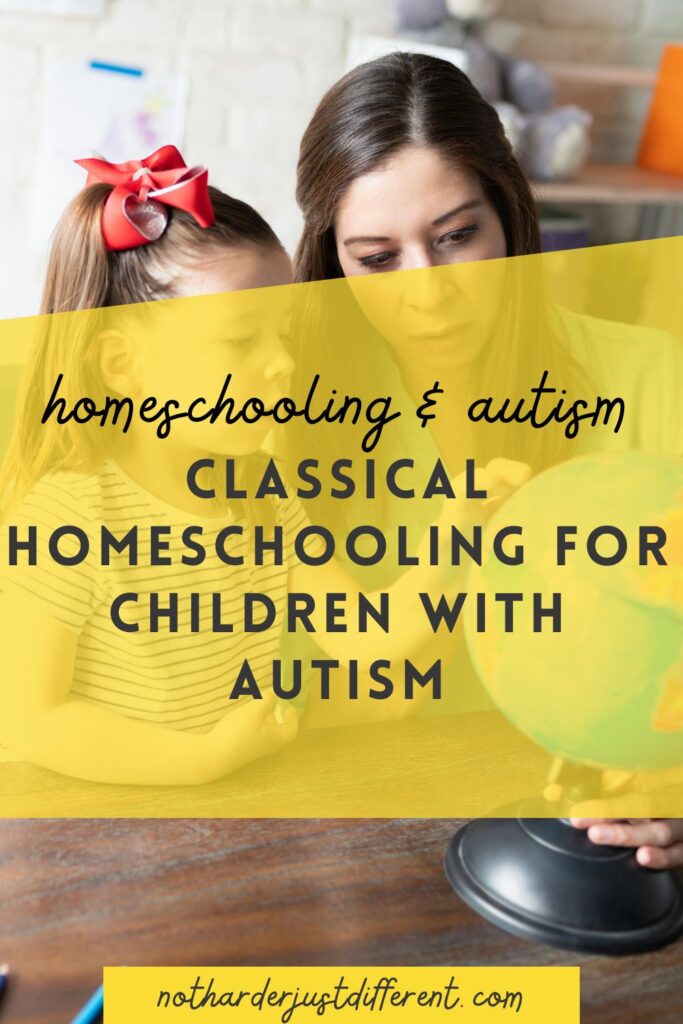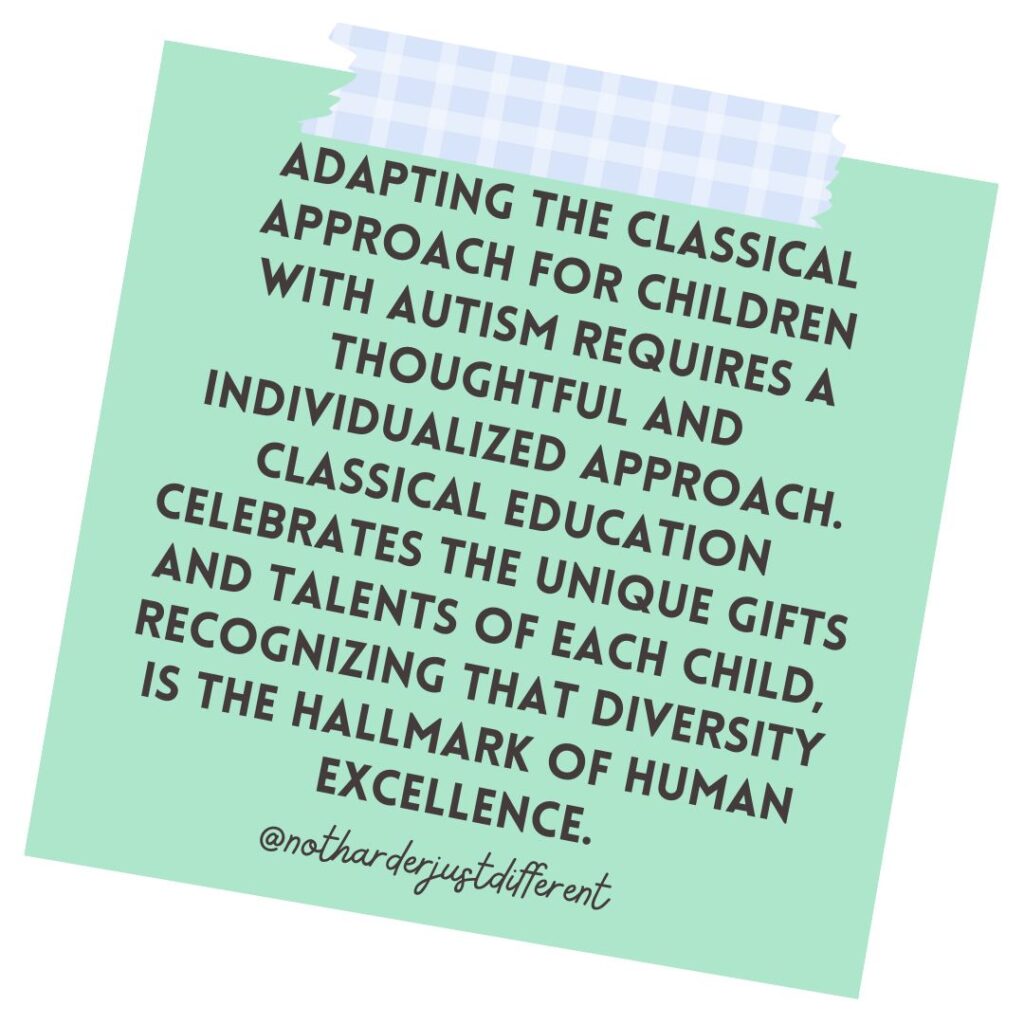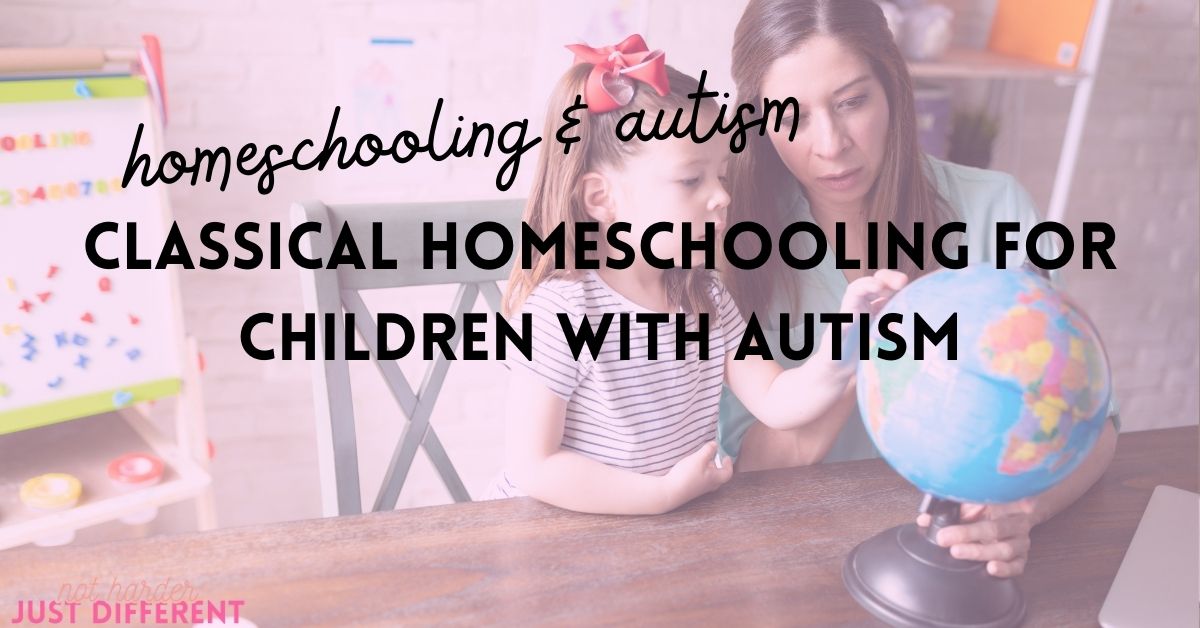Disclaimer: As a future Licensed Clinical Social Worker (LCSW) currently pursuing my master’s degree, I am passionate about sharing insights and information related to parenting, autism and homeschooling based on my personal experiences and research. However, the content shared on this blog is not intended to substitute professional advice, diagnosis, or treatment. Parenting is a deeply personal journey, and while I strive to provide valuable insights, every family and situation is unique. Readers are encouraged to consult with qualified professionals for personalized guidance tailored to their specific needs and circumstances.
Imagine a homeschooling environment where the great works of literature, history, and philosophy come alive, inspiring a love for learning that spans the ages. That’s the essence of Classical education—a rigorous yet enriching approach that cultivates the mind, character, and virtue of each child.
A simple google search about homeschooling will likely pull up “Classical Conversations”, a very popular homeschool method with in-person enrichment meetups and a 4 year history cycle. There is so much rich, historical learning in the Classical method that I love learning about. I actually went to a small, Classical, Socratic-method charter high school, and I loved my time there.
That said, this method hasn’t been super fun for Bug. And that’s okay! It’s incredible that we get to choose what we do with our homeschool. I definitely believe there is so much to gain from the Classical Method! Let’s talk about it!

Classical Homeschooling for Children with Autism
Understanding Classical Homeschooling
Classical education is rooted in the ancient traditions of Western civilization, drawing inspiration from the teachings of Socrates, Plato, and Aristotle. At its core is the belief that education should be grounded in the pursuit of truth, goodness, and beauty. The Classical curriculum is structured around the Trivium—grammar, logic, and rhetoric—which forms the foundation for a well-rounded liberal arts education.
In a Classical homeschool, children engage with timeless works of literature, philosophy, and art that have shaped the course of human history. They learn to think critically, reason logically, and express themselves eloquently through writing and speaking. Classical education fosters a deep appreciation for the richness and diversity of human culture, empowering children to become thoughtful, engaged citizens of the world.
Why Classical Homeschooling Works Well for Children with Autism
Classical homeschooling presents several features that are particularly advantageous for children with autism:
- Structured and Sequential Learning: Classical education follows a structured and sequential approach, with a curriculum based on the Trivium—grammar, logic, and rhetoric. This systematic progression provides children with autism clear expectations and a sense of order, which can be comforting and conducive to learning.
- Emphasis on Logic and Reasoning: Classical education places a strong emphasis on logic and reasoning skills, encouraging students to think critically and analytically. For children with autism, who may excel in logical thinking and have a keen attention to detail, the emphasis on logic provides a framework for understanding complex concepts and making connections between ideas.
- Exposure to Great Works of Literature and Philosophy: Classical education exposes students to the great works of literature, philosophy, and history that have shaped civilization. For children with autism, who may have a deep interest in specific topics or periods of history, the opportunity to explore these subjects in depth can be highly engaging and intellectually stimulating.
- Development of Language and Communication Skills: Classical education emphasizes language and communication skills through the study of grammar, vocabulary, and rhetoric. For children with autism, who may struggle with language development and social communication, the structured approach of classical education provides opportunities to improve language skills and express themselves effectively.
- Cultivation of Virtue and Character: Classical education places a strong emphasis on the cultivation of virtue and character, with an emphasis on integrity, courage, and moral excellence. For children with autism, who may benefit from clear expectations and moral guidance, the focus on character development provides a framework for understanding ethical principles and making informed decisions.
- Integration of Subjects and Themes: Classical education integrates multiple subjects and themes across the curriculum, allowing students to make connections between different areas of learning. This interdisciplinary approach helps children with autism see the relevance and interconnectedness of what they are studying, fostering a deeper understanding of concepts and promoting critical thinking skills.

Tailoring Classical Education for Autism
Adapting the Classical approach for children with autism requires a thoughtful and individualized approach. Classical education celebrates the unique gifts and talents of each child, recognizing that diversity is the hallmark of human excellence.
- Create a supportive learning environment that honors your child’s strengths and accommodates their needs.
- Provide clear expectations and structure to help your child navigate their educational journey with confidence and success.
- Break lessons into manageable chunks, allowing for frequent breaks and opportunities for movement and sensory exploration.
Practical Tips and Strategies
Let’s delve into the practical side of Classical homeschooling! Start by selecting high-quality curriculum resources that align with the Classical approach and meet your child’s individual learning needs. Choose literature-rich materials that engage your child’s imagination and foster a love for reading and storytelling.
Incorporate Socratic dialogue and discussion into your homeschooling routine, encouraging your child to ask questions, think critically, and engage in thoughtful inquiry. Explore the great works of literature, history, and philosophy together, inviting your child to wrestle with timeless ideas and grapple with complex moral and ethical dilemmas.
Embracing the Classical Tradition
At the heart of Classical education lies a deep reverence for the pursuit of truth, goodness, and beauty. Classical homeschooling invites us to embark on a journey of intellectual discovery and moral formation, cultivating the virtues of wisdom, courage, and integrity in our children.
Embrace the Classical tradition as a guide for living a life of purpose and meaning. Encourage your child to seek truth, to question the status quo, and to strive for excellence in all things. Through the study of the great books and ideas of Western civilization, we have the opportunity to instill in our children a deep appreciation for the richness and complexity of the human experience.
By embracing the Classical tradition, we equip our children with the knowledge, skills, and moral virtues they need to navigate an ever-changing world with wisdom, grace, and resilience. As with all methods, take what works and leave what doesn’t, and unlock the extraordinary potential within your child with autism through the timeless wisdom of Classical homeschooling!

